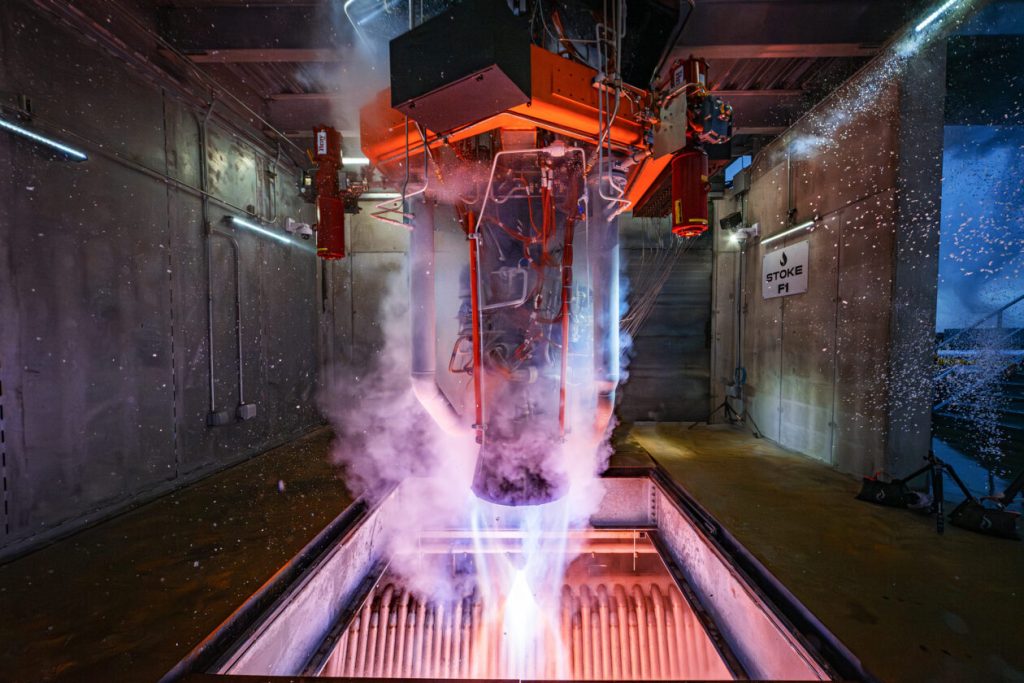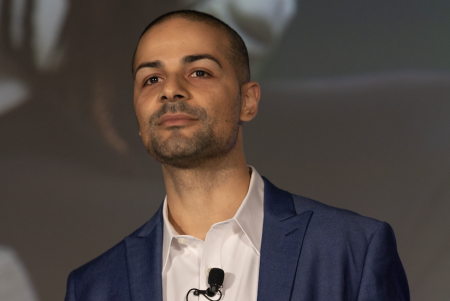Stoke Space, a burgeoning aerospace company based in Kent, Washington, has achieved a significant milestone in its pursuit of fully reusable rockets. On a Thursday in late 2023, the company successfully conducted a hotfire test of its first-stage rocket engine on a newly constructed vertical test stand at its Moses Lake facility. This event marks a pivotal moment for the four-year-old startup, signifying a substantial leap forward in its ambitious endeavor to revolutionize space travel. The successful test, captured in dramatic photographs released by the company, is a testament to the dedication and ingenuity of the Stoke Space team, who celebrated the achievement as an “incredible team effort.”
The significance of this test lies in several key aspects. Firstly, it represents the inaugural hotfire of Stoke’s Block 2 stage 1 engine in its flight configuration, a crucial step towards integrating the engine into a functional rocket. Secondly, the engine employs a complex architecture known as full-flow staged combustion (FFSC), a challenging technology mastered by only two entities globally: Stoke Space and SpaceX. This combustion method offers significant performance advantages, maximizing the energy extracted from the propellant and enabling higher thrust levels. The successful implementation of FFSC underscores Stoke’s technical prowess and its commitment to pushing the boundaries of rocket engine technology. Thirdly, conducting the test in a vertical orientation, mimicking the actual flight conditions, holds immense value for gathering accurate data and refining the engine’s performance. This approach, aligned with Stoke’s “test like you fly” philosophy, ensures that the engine is rigorously evaluated in a realistic environment, maximizing its reliability and efficiency in future missions.
The successful hotfire test is a culmination of years of dedicated work by the various teams at Stoke Space. The Block 2 stage 1 engine, fueled by liquefied natural gas and liquid oxygen, is capable of generating a remarkable 100,000 pounds of thrust, providing the necessary power to propel Stoke’s rockets into orbit. While the exact duration of the test remains undisclosed, its success validates the engine’s performance and paves the way for further development and integration. The vertical test stand at the Moses Lake facility, specifically designed for this purpose, plays a crucial role in enabling these critical tests. The stand allows engineers to simulate the stresses and conditions experienced during an actual launch, ensuring that the engine performs as expected in a flight environment.
The choice of Moses Lake as the testing site is strategic. The location offers ample space and favorable weather conditions, minimizing disruptions to testing schedules. Furthermore, Moses Lake’s proximity to Stoke Space’s headquarters in Kent, Washington, facilitates efficient collaboration and communication between the engineering and testing teams. The successful completion of this test reinforces the company’s commitment to its Moses Lake operations as a critical hub for its ongoing development and testing activities. The company’s CEO, Andy Lapsa, a veteran of Blue Origin, expressed his excitement about the new test stand, calling it “a beauty” and highlighting the “gorgeous clean burn” of the engine during the test.
Stoke Space’s relentless pursuit of innovation is driven by the vision of its founders, Andy Lapsa and Tom Feldman. Both bring extensive experience from leading aerospace companies, having worked at Blue Origin and SpaceX, respectively. Their combined expertise and shared passion for space exploration have shaped Stoke Space’s mission to develop fully reusable rockets with aircraft-like operability. This ambitious goal aims to drastically reduce the cost and turnaround time associated with space launches, democratizing access to space and enabling more frequent missions. The company’s commitment to reusability is a cornerstone of its strategy, reflecting a broader industry trend towards sustainable and cost-effective space travel.
The recent success builds upon a series of achievements for Stoke Space. In 2023, the company secured a substantial $100 million funding round, providing the necessary resources to accelerate its development efforts. This investment underscores the confidence of investors in Stoke Space’s vision and its potential to disrupt the space industry. Furthermore, the company successfully conducted an up-and-down test of its “Hopper” developmental rocket vehicle, demonstrating its vertical takeoff and landing capabilities. This crucial test validated the fundamental technology required for reusable rockets, paving the way for more complex flight tests in the future. The Hopper tests represent a significant step towards realizing Stoke Space’s goal of achieving rapid reusability, mimicking the operational efficiency of aircraft.
The recognition of Andy Lapsa as an “Uncommon Thinker” at the GeekWire Gala further highlights the company’s innovative approach and its potential to transform the aerospace industry. This award acknowledges Lapsa’s visionary leadership and his contributions to advancing space technology. The honor serves as a testament to the dedication and ingenuity of the entire Stoke Space team, reinforcing their commitment to pushing the boundaries of space exploration. The company’s innovative culture and ambitious goals have attracted top talent from across the aerospace industry, further strengthening its capabilities and accelerating its progress.
Stoke Space’s successful engine test signifies a major step forward in its mission to develop fully reusable rockets. The company’s innovative FFSC engine technology, coupled with its rigorous testing methodology, positions it as a key player in the evolving landscape of private spaceflight. With continued investment and development, Stoke Space has the potential to revolutionize access to space, making it more affordable and frequent, and opening up new possibilities for scientific discovery, commercial ventures, and human exploration. The company’s commitment to reusable technology aligns with a growing industry focus on sustainability and long-term viability, ensuring a responsible and efficient approach to space exploration for future generations. As Stoke Space continues to refine its technology and conduct further tests, the dream of routine and accessible space travel edges closer to reality.















